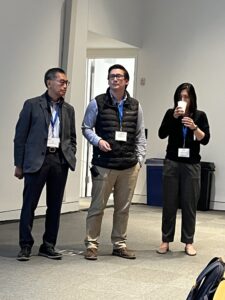Roundtable discussion on the current state of biomedical science
During the Annual Symposium, JCC hosted a roundtable discussion on the current state of biomedical science. Panelists Dr. Katherine Wu, Dr. Chi Van Dang, and Dr. Eric Van Dang offered their experience and perspective for the audience. Dr. Katherine Wu is a Scientific Staff Writer for The Atlantic. Dr. Chi Van Dang is the Scientific Director of the Ludwig Institute for Cancer Research and Bloomberg Distinguished Professor of Cancer Medicine at Johns Hopkins. Dr. Eric Van Dang, is Tenure-Track Investigator at NIH and former JCC Fellow. The discussion focused on career trajectories and science communication via traditional and social media.

Roundtable panelists Dr. Chi Van Dang, Dr. Eric Van Dang, and Dr. Katherine Wu. Photo from Dr. Sue Biggins.
Career trajectories
The panelists started the evening by discussing the transition from a postdoc to the next career stage. In the academic path this has meant starting your own lab. However, the panelists noted that “alternative” career paths are becoming more of the norm for PhD-trained scientists. Dr. Chi Van Dang posited that a postdoc is a place to discover one’s self, in addition to discovering new science. He has had former postdocs obtain positions in law, industry, and scientific writing, in addition to academia. He notes that “values are individual” and so a path that is fulfilling for one person may not be the right path for another.
Dr. Katherine Wu reflected on her journey transitioning to scientific journalism after her PhD studies. Dr. Wu sometimes wondered if former mentors were disappointed in her choice, and if it was worth it to get a PhD at all. Reflecting on her journey, Dr. Wu notes that she is passionate about making experimental science come to life for the general public. She loves communicating science that animates the people, actions, and decisions that drive the scientific story. Dr. Wu reflects that many of the skills that helped her succeed in graduate school – being inquisitive, interdisciplinary, and experimenting – are also key to her work as a scientific writer. She notes that a lot of her career progress has come through learning from failure. In that way, she views being a journalist as similar to being a PI in that graduate school does not train for either of those specific skillsets, rather they are honed through experience.
Dr. Eric Van Dang recently opened his lab at the National Institute of Allergy and Infectious Diseases. Dr. Eric Van Dang noted that part of what made this position the right next step for him was working at the bench more and not doing as much grant writing. With trainees in his lab, he views his role as sharing his perspective with them when relevant to their career desires, and connecting them to individuals in his network when he does not have the experience to help guide them on their path.
Communicating through traditional and social media
The panelists next waded into scientific communication and discussed the tension in communicating clearly and accurately with non-scientists through various forms of media.
One central theme of this discussion was the role of (un)certainty in scientific discourse. Dr. Eric Van Dang stated that dealing with uncertainty is a fundamental aspect of science, yet this uncertainty can be misconstrued by the general public. Dr. Chi Van Dang contrasted science with pseudoscience. In his view, science is very concerned with getting the answer correct, and not necessarily concerned with messaging. In contrast, pseudoscience has very strong messaging, yet it is essentially irrelevant if the actual message is correct or not. Thus, Dr. Chi Van Dang thinks that scientists should differentiate between communication with other scientists and with the general public, and make their communication to the general public more confident so as to be taken more seriously.
Dr. Katherine Wu noted the temporal aspect of science plays into how scientists communicate with the general public. That is, since our understanding evolves over time, overstating the best current understanding can backfire as that understanding changes. She used messaging in the recent COVID-19 pandemic as an example. Early statements saying that only healthcare professionals needed to wear masks were later used as evidence that requiring mask wearing from all was not important.
The panelists share the view that scientists funded through public sources are responsible for sharing how the funding is being used with the general public. In particular, the panelists suggested doing so when a finding is exciting or translatable. They also agreed that incentives are lacking in the current infrastructure of science for doing this type of communication. There was not a consensus or a clear picture on how exactly to do this. However, Dr. Wu noted that Twitter had served as a town square where scientists and the general public can interact and engage. (The reduction of content moderation on Twitter has limited her personal usage of the application.)
Dr. Chi Van Dang shared that as Scientific Director of the Ludwig Institute for Cancer Research he often distills science into brief take away points for congressional staffers and potential donors. He thinks that NASA and astronomers do a marvelous job of engaging the public through pictures of planets and galaxies on the front pages of newspapers. Therefore, he encourages biological scientists to make similar in roads with the public through wider-spread dissemination of interesting microscopy images and other visual data.
The roundtable discussion did a wonderful job of helping JCC Fellows think broadly about current topics. Thanks to Dr. Catherine Wu, Dr. Chi Van Dang, and Dr. Eric Van Dang for joining the JCC Annual Symposium!